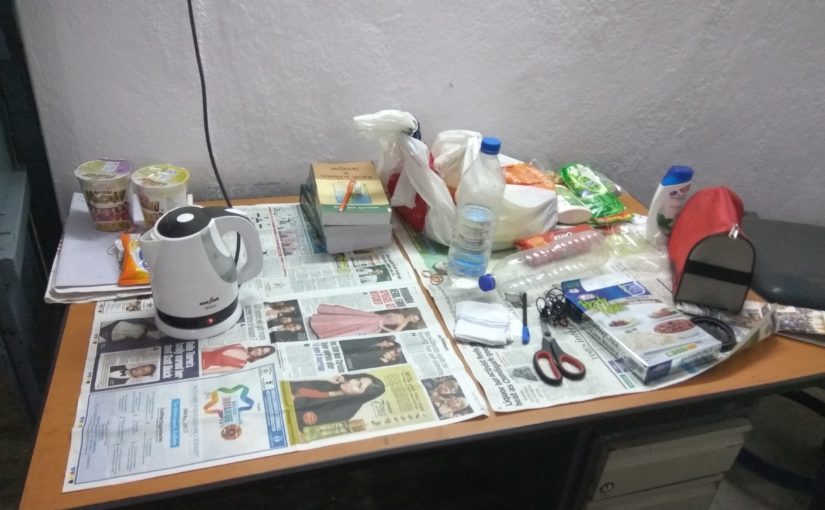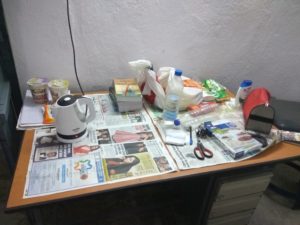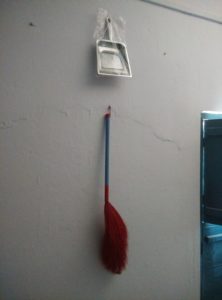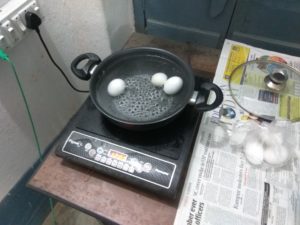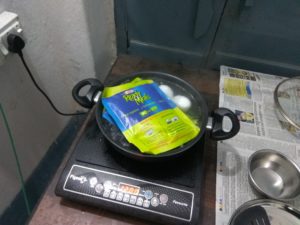I’d said at the end of the last segment that I would stop giving a day to day narrative and focus on some specific things that I did, saw or had done to/for me. One such thing, which actually involved practically everything I did there, was surviving away from home. You see, unlike a lot of people who get their first taste of life away from home in the heady days of college (and write extensive eulogies later), I had no desire of living away from my parents as a student. Neither did I later, or now for that matter. So was it forced upon me ?
Yes, but it was also something that ignited some ideas I had about living away from home. What were these ideas ? I’d imagined myself (as I explained earlier), that I had wanted to live in a city in a small apartment of my own. I had probably also mentioned that I wanted to stand on the balcony and take in the evening air with a cigarette in hand and the neon lights of the night for company. There would be some beer on hand, a cool breeze in the air and thoughts of home, hope and perseverance in my mind. That would be something now.
All of this had taken a somewhat concrete shape in my early days in Tehatta courtesy of my buying a book that is not famous for describing life away from home. It was Camus’ The Outsider , a book about not belonging anywhere and not feeling what society wishes you to feel. Yet in those days what struck me was the fact that the protagonist lived in a small flat by himself in a non-descript part of Algiers, working hard but also trying to enjoy the few moments he had available. His home had a bed, some place for cooking perhaps and a balcony. I imagined yellow walls, a small bedside table maybe, and a central table where I would sit and work (or drink) to my heart’s content.
Instead, as I mentioned earlier, I had gotten hold of some prime rental property on the ground floor. So there would be no view from above, but there would be plenty of bugs, dampness and perhaps some flooding (none occurred, thankfully). It would however also be cool in summer, which would help a little when the dreaded loadsheddding occurred. I also had a house that was too big for my needs.
There was a kitchen space, a dining area, two rooms and a bathroom. Overall, this would make for a rather cozy but none too large home for a couple with a child (or two rather young children). For me though, it was a huge space with which I had no idea what I would do.
Initially, I had started out with a bed, an office table (the same model that my college used, and perhaps the only one available in that size in Tehatta), and some utensils and bathing equipment. My goal was to create a living space that would mirror my preferences – simple, efficient and easy to maintain. To this end, I arranged everything beautifully, at arm’s reach, assuming that I would regularly stay and clean things.
As it turned out, this was a mid-winter’s dream. As long as winter prevailed, things would work out well with what I had. As soon as February hit, I had to get hold of a fan. The fan I did get was a poor excuse of a Bajaj Panther, though it called itself so and claimed a mighty warranty. Within days, the fan began to dance like a possessed spirit, making crackling sounds that kept me awake at night, googling videos of watermelons being sliced off by falling ceiling fans. Needless to say, I dared not keep the fans at full speed anytime during night or day. Also needless to say, the combined effect was not exactly refreshing for body and soul.
Complaints led to the mechanic, a muscular guy who claimed to hail from Ranaghat (he gave me this information with a touch of pride for some reason), resulted in some Tehatta treatment. The guy observed the fan trying to give up its ghost, pranced onto the camp bed and landed a couple of mighty blows to the central wheel. The crackling sounds died out, for exactly forty-eight hours. The next time I complained, he simply asked me to claim the warranty.
The other thing that I got hold of though, and which served me far better than the fan, was a tubelight. I’d thought of surviving with the largest and highest wattage LED lamp I could find. Turned out, it was too much and given that it was a single point rather than an elongated object, hurt my eyes. The tubelight gave the home a more traditional feel, and allowed me to imagine (once more) that I was setting up a home away from home.
Except I wasn’t. If I had, the title of this piece would have been A Home Away From Home. The reason it isn’t so is because I hardly lived in it. My routine was such that I actually spent no more than two (or at most three) nights a week in Tehatta, and that was excluding any holidays that I may have availed from time to time. This ensured that I didn’t so much live in Tehatta as camp there. And after a while, that’s what I started calling it – camp.
Another reason for this shift of nomenclature was the pathetic job of home maintenance that I did. For want of a maid, my home enjoyed a weekly dry sweep (jharu) without a wet sweep (poccha). This ensured on one hand that I soon had a raging spider infestation all over the house, and also that the floor steadily became more and more rough and unpleasant to walk upon. Utensils that I used came down to the absolute minimum and ensured that the others were given over to cobwebs, lizard shit and plain ol’ dust. The sphere within which I lived and didn’t have to deal with the insect ecosystem steadily shrunk until I was defending the little space I required to clean the utensils, the bedroom and the part of the bathroom I actually used.
Each time I returned after a couple of days in Kolkata (and I ensured it wasn’t shorter than that), I would have to settle down and promptly begin cleaning. Even the once-a-week cleaning ritual would take time, since it was after all, once a week. Also, much to my chagrin, the assortment of spiders that had begun to call my camp their home, proved extremely resilient to all forms of disinfectant. Things reached a head when a large wolf spider turned up and had to be exterminated by a combination of phenyl and other corrosive disinfectants. Scars of the battle are permanently etched in the form of a large phenyl stain in the washbasin.
The wolf spider, despite being the most alarming, was hardly the only creature, or the only large spider for that matter, that I had to deal with. Once I returned to use the bucket, only to find a large spider crawling out of the mug. Another time, a frog got in and had to be scooped up and removed with the dustpan. Frogs are remarkably immune to sharp pan edges and jump off the pan the moment you start moving or raising it. Even at the threshold, I had to spend nearly a quarter of an hour trying to push it over the edge (literally!)
As all this would have made patent, my dreams of setting up my home away from home were fast dissolving in pungent phenyl, exhausting brooming rituals and very soon, a sinister one involving a fly broom being jabbed at thin air just as the evening set in. All of this was to ensure that the spiders didn’t encroach further on my lebensraum. But inevitably they did, and the war of attrition continued.
Matters weren’t helped by the fact that the location ensured that I could not keep the windows open at night while I slept. This turned my bedroom into a sauna sans the steam, and my body into a big slab of flesh being baked on low heat. The fan, as you’d expect, didn’t help matters. Neither did the fact that the bed itself was gradually developing its own unique concept of curvature. Given enough time, it would have taken the shape of a convex parabola, putting my head and feet at a distinct disadvantage compared to my torso.
Last but not least, there was the food problem, which deserves a book of its own. You see, initially I had planned to live off the land, or the “hotels”, as was actually the case. In the early days, this meant going to the Maa Durga hotel and eating twice a day. Then I began to pack the dinner in a tiffin box after I’d had my lunch. Problem was, the hotel was really far away from my camp, and hotfooting in the Tehatta sun to have a meal and hotfooting it back was really not my cup of tea. Further, packing lunch in the afternoon to have it in the night inevitably carried the risk of spoilage. As I learned one night over uncannily tangy fare, the summer would not tolerate this little convenience. True, there were roll shops and more than once I would simply head out and get a roll or Mughlai paratha for the night. But the food was incredibly spicy and oily and wouldn’t do my stomach any favours.
By this time, the more enterprising folks in my college had arranged for a certain Bappa Hotel to deliver food in the afternoon. Bappa proved to be standard hotel fare – spicy and extremely sparing when it came to anything beyond lentils and the cheapest of vegetables. However, it also proved to be rather late in arriving, the delivery boy (really the owner of the hotel himself and really a rather middle-aged man) apologizing with all 32 teeth before repeating the performance the very next day.
However, the smiling assassin of schedules and appetites also offered to deliver food home. He apparently delivered to high officials like the BDO of Tehatta, and wanted to add another feather to his I-deliver-to-camping-government-officials cap. He also wanted to lobby for the canteen at a time when the very idea of setting up a canteen had not been mooted. To both ends, he began to deliver food at half past eight to half past nine, provided I informed him latest by the early evening.
This would have worked fine, and for my colleagues, it did. However, geography played truant, again. You see, my colleagues lived near the hotel, while I lived far away. For all his boasts about delivering to the BDO, it seemed he was less interested in delivering to me. The result was that on more than one night, I had to face an irate landlady wondering when she could close the gate.
In keeping with the minimalism that had become my motto in Tehatta, I decided to fall back upon what I could make on my own. This basically came down to
a. Cup noodles
b. Eggs
I was already having a combination of eggs, cup noodles and bananas for breakfast. I extended it to dinner, such that for a time my dinner became boiled eggs and cup noodles in boiling water. This too would have worked out, but for the fact that I had to consume multiple cups to satiate the rats in my belly (a good ol’ Bengali metaphor). Also, boiling eggs in the electric kettle wasn’t the safest of things to do with kettles.
So by the time my first year in Tehatta neared its end, I was bogged down by multiple inefficiencies, which were taking a toll on my preparedness for dealing with college and the long road home. After some intensive lobbying on my part and overriding the argument that I may “soon” get through to a CSC college (actually I did over eight months later), I persuaded my parents to visit Tehatta again. This was November of 2016, and my parents chose to club the visit with a pilgrimage to Nabadwip, one which I did not partake in. Anyhow, they brought with them a new fan, another mattress (toshok, not godi), and most vitally, an induction cooker and its attendant utensils. By this time I had lost all hope of ever turning camp into a second home, and chose to fix only what had to be fixed. However, the fixing also included a mop and a bucket for the poccha that I’d so diligently avoided till date.
Life after the visit became far more comfortable. Even as winter gradually made the fan unnecessary for a while, it proved to be a boon in the summer months that I had to stay there. The geometric aspirations of my camp bed were stalled by the mattress and the mop gave my war against the arachnids a fresh lease of life. I could now roam about the house without constantly worrying about cobwebs and sleep with greater access to air circulation and a more naturally-curved spine.
Most importantly (and I can’t stress this enough), the induction cooker made life a lot easier. I quickly shifted from boiling eggs in the kettle to frying them in the pan. This simple and fast recipe allowed me to create such culinary monstrosities as a huge circular block of fried egg which I called egg parantha. As I was promptly told, an egg parantha wasn’t what I’d wrought, but even such cooked food tasted heavenly.
Further, in what turned out to be the last stage of fooding evolution, I began to purchase ready-to-eat meals. These had to be heated in water, and given my phobia of being drenched in boiling water, took a lot more time than the eggwork. Yet it gave me hot meals that had some semblance to what a real dinner would look like. I could finally have a delicious meal and go to sleep contentedly on a comfortable bed, in a comfortable room with good air circulation.
No doubt this situation would have changed again in the future. I was already planning on doing some actual cooking, including preparing rice by myself. Given the gradual mastery I was attaining over the induction cooker, this was not as unrealistic as it may have been at the start of my life in Tehatta. I may also have come up with some recipes of my own, things that would involve eggs, bananas and myriad other things that I hadn’t even thought of yet.
But as with everything in life, the ready to eat meals proved to be the last stage of my camp life. As I was attaining mastery over these tools and recipes in March of this year, I was also running around CSC offices inquiring about the state of my interview recommendation. As regular classes dissolved, my camp life shrank. With the interview in late April and the appointment soon after, I knew I was never going back to living in Tehatta the way I’d become used to over the past year and a half.
But Tehatta wouldn’t go out without one last hurrah. In late May, as my rounds of Bikash Bhavan became ever more frequent and I spent virtually all my spare time in Kolkata, the question of whether I would pay the rent for June came up. It was decided that I wouldn’t. Instead, I would stay over for a night, pack things up and then load them up into a small truck that would be sent for me.
That night, I skipped the sweeping, but was true to my cooking. For one last time in Tehatta, I prepared eggs and a ready to eat meal, and dined on the plates that had gradually fallen into disuse over the past two months. It was nothing special, and far from anything extraordinary. For really, shifting from one way of fooding to another, and sleeping on hard beds with shoddy fans hardly constituted anything glorious in the grand scheme of things.
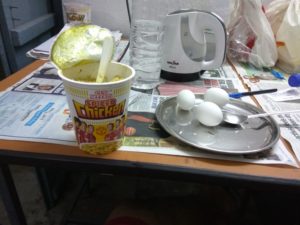
Yet it did mark the end of a period where I had constantly adjusted, improvised and persevered. It was indeed the first time in my life that I’d been away from home, and sans the training of friends or hostels, I’d succeeded in living on my own terms. Perhaps the home had become a camp, and I’d had to do a thousand things that could have been avoided in hindsight. Perhaps I was more terrified and arrogant and careless at the same time of things that would not have scared someone else – of things that wouldn’t scare me today. But that maturity had to be earned, and I could only earn that if I did what I did – I survived.
